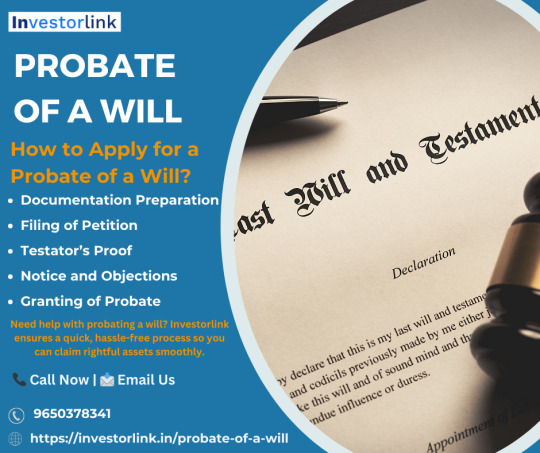#ProbateOfAWil
Explore tagged Tumblr posts
Text
Dematerialisation and Tax Benefits: What Every Investor Should Know
Investing in shares is a great way to build wealth, but managing physical share certificates can be a hassle. With the rise of digital technology, Dematerialisation of Shares has become the preferred way to hold investments. Not only does it make handling shares easier, but it also comes with tax benefits.
In this article, we’ll explain Dematerialisation of Shares, how it can help reduce tax burdens, and what role Probate of a Will and Letter of Administration play when dealing with inherited shares.
What is Dematerialisation of Shares?
Dematerialisation of Shares is the process of converting physical share certificates into electronic form. These digital shares are stored in a Demat account, making transactions faster and safer.

Why Should You Dematerialise Your Shares?
No Risk of Losing Certificates – Paper share certificates can be misplaced, damaged, or stolen. Digital shares remain safe in your Demat account.
Easy Transactions – Buying, selling, and transferring shares becomes seamless and faster.
No Paperwork Hassles – You don’t have to worry about signing physical documents every time you trade shares.
Mandatory by Law – SEBI (Securities and Exchange Board of India) has made it compulsory for investors to hold shares in Demat form for most transactions.
Now that you understand why dematerialisation is important, let’s look at the tax benefits it offers.
Tax Benefits of Dematerialisation of Shares
1. Reduced Tax on Long-Term Capital Gains (LTCG)
When you sell shares, you may have to pay capital gains tax on your profits. The tax depends on how long you hold the shares:
Short-Term Capital Gains (STCG) – If you sell shares within one year of buying, you pay a 15% tax on the profits.
Long-Term Capital Gains (LTCG) – If you hold shares for more than one year, profits above ₹1 lakh are taxed at 10% without indexation benefits.
With Dematerialisation of Shares, all transactions are electronically recorded, making it easy to track your holding period. This helps investors plan their sales to benefit from the lower LTCG tax rate.
2. No Tax on Bonus Shares and Splits
Companies often issue bonus shares or share splits to investors. When shares are in Demat form, these corporate actions happen automatically. Since you are not selling shares, no tax is applicable at the time of receiving these benefits.
However, if you later sell the bonus shares, capital gains tax applies. Keeping them in Demat form helps maintain proper records for tax calculations.
3. Avoiding TDS on Dividend Income
When companies pay dividends, they deduct Tax Deducted at Source (TDS) if the total dividend exceeds ₹5,000 in a financial year. With Dematerialisation of Shares, dividends are directly credited to your bank account, making it easier to track and claim tax benefits while filing your Income Tax Return (ITR).
4. Reduced Tax Burden When Transferring Shares
With physical shares, transferring ownership often involves stamp duty charges, which add to costs. When shares are held in Demat form, these charges are either lower or not applicable, reducing your tax burden when transferring shares to family members or legal heirs.
Dealing with Inherited Shares: Probate of a Will and Letter of Administration
Sometimes, investors inherit shares from their parents or relatives. In such cases, Probate of a Will or Letter of Administration may be needed to claim ownership and transfer shares.
1. What is Probate of a Will?
If the deceased person left a will, their legal heirs must obtain Probate of a Will from the court. This document confirms that the will is valid and allows the executor to distribute assets, including Dematerialised Shares.
2. What is a Letter of Administration?
If there is no will, legal heirs need to apply for a Letter of Administration in court. This legal document gives the heirs the right to manage and distribute the deceased person’s assets, including shares.
How Does Dematerialisation Help in These Cases?
If shares are in Demat form, transferring them to heirs is much easier compared to physical certificates.
The probate process is faster when shares are dematerialised because there’s a clear electronic record of ownership.
No risk of lost share certificates, which is a common issue when dealing with inherited shares.
Conclusion
Dematerialisation of Shares is not just about making investments easier—it also comes with significant tax benefits. From reducing capital gains tax to avoiding unnecessary stamp duties, holding shares in Demat form helps investors save money.
For those inheriting shares, obtaining Probate of a Will or a Letter of Administration is necessary to claim ownership. However, if shares are already in Demat form, the process becomes much smoother.
If you haven’t dematerialised your shares yet, now is the time to do so. It’s a simple step that can save you from future hassles while also helping you manage your taxes better.
Would you like professional assistance with dematerialisation or share recovery? Reach out to an expert today!
#DematerialisationOfShares#StockMarket#Investing#TaxBenefits#CapitalGainsTax#Shares#ProbateOfAWil#LetterOfAdministration#WealthManagement#FinancialPlanning#InvestmentTips#StockTrading#EstatePlanning#Inheritance#ShareTransfer#DematAccount
0 notes
Text
Probate of a Will: How to Protect Your Loved One's Legacy: A Complete Process Explained
Losing a loved one is an emotional experience. However, dealing with their estate and assets can add stress during such a difficult time. Understanding the Probate of a Will, Letter of Administration, and Succession Certificate can help make the process smoother and protect your loved one’s legacy.
What is Probate of a Will?
The Probate of a Will is a legal process where the court verifies the authenticity of the deceased person's will. This ensures that the will is genuine and grants the executor the authority to manage and distribute the assets according to the deceased’s wishes.

Why is Probate Important?
It confirms the validity of the will.
It provides legal authority to the executor to handle the estate.
It protects the rights of beneficiaries.
It prevents disputes among family members.
Steps Involved in the Probate Process
Filing the Petition: The executor or a legal representative file a petition in the court along with the original will and the death certificate.
Notice to Heirs and Beneficiaries: The court notifies all interested parties, giving them a chance to object to the will if necessary.
Verification of the Will: The court reviews the will to ensure it meets legal requirements and is not forged.
Appointment of Executor: The court appoints the executor mentioned in the will or assigns an administrator if there is no executor.
Asset Inventory and Debt Settlement: The executor identifies all assets and settles any outstanding debts.
Distribution of Assets: After settling debts and taxes, the remaining assets are distributed to the beneficiaries as per the will.
What is a Letter of Administration?
If a person dies without a will (intestate), the court issues a Letter of Administration. This document grants authority to a legal representative (usually a close family member) to manage and distribute the deceased’s assets.
When is a Letter of Administration Needed?
When the deceased did not leave a will.
When the will is invalid or incomplete.
When the named executor is unwilling or unable to act.
Steps to Obtain a Letter of Administration
Filing an Application: Submit an application in the court along with the death certificate and details of legal heirs.
Notice to Interested Parties: The court notifies all heirs and creditors.
Court Hearing and Verification: The court reviews the application and verifies the claim.
Issuance of the Letter: Once approved, the legal representative is appointed to handle the estate.
What is a Succession Certificate?
A Succession Certificate is a legal document issued by the court that allows the rightful heirs to claim the deceased’s movable assets like bank accounts, securities, and debts.
When is a Succession Certificate Required?
When there is no will or clear nomination for bank accounts or other financial assets.
To recover debts owed to the deceased.
To transfer shares, bonds, and other securities.
How to Obtain a Succession Certificate
File a Petition: Submit the application in the relevant court with the death certificate and details of the legal heirs.
Publication of Notice: The court publishes a notice in newspapers to invite objections.
Hearing and Verification: The court reviews the application and any objections.
Issuance of the Certificate: Once approved, the certificate is issued to the rightful heirs.
How to Protect Your Loved One's Legacy
Draft a Clear Will: Ensure the will is legally valid and up-to-date.
Appoint a Trusted Executor: Choose someone responsible and capable of managing the estate.
Maintain Proper Records: Keep documents like property deeds, bank statements, and insurance policies organized.
Seek Legal Assistance: Consult a lawyer to navigate the legal processes and avoid disputes.
Conclusion
Understanding the Probate of a Will, Letter of Administration, and Succession Certificate is essential to protect your loved one’s legacy. By following the right legal procedures, you can ensure a smooth and fair distribution of assets and honor your loved one’s wishes.
#ProbateOfAWil#LetterOfAdministration#SuccessionCertificate#EstatePlanning#LegalProcess#InheritanceRights#WillExecution
0 notes
Text
Common Challenges in Obtaining a Succession Certificate and How to Overcome Them
Introduction
When a loved one passes away, their legal heirs often need to claim assets like bank accounts, shares, and property. To do this, they may require a Succession Certificate, Letter of Administration, or Probate of a Will. However, getting these legal documents is not always easy. Several challenges can delay or complicate the process. In this blog, we will discuss the common challenges people face when applying for a Succession Certificate and how to overcome them.
What is a Succession Certificate?
A Succession Certificate is a legal document issued by a court to the legal heirs of a deceased person. It allows them to claim or transfer the deceased person’s movable assets such as bank deposits, shares, or debts. It does not apply to immovable assets like land or property.

Common Challenges in Obtaining a Succession Certificate
1. Lack of Awareness About the Process
Many people are unaware of how to apply for a Succession Certificate. They do not know where to start or what documents they need.
Solution:
Visit the district court or consult a legal expert to understand the process.
Research online about the required documents and steps involved.
2. Incomplete or Missing Documents
The court requires several documents, including the death certificate, identity proofs, and details of the deceased's assets. If any document is missing, the application may be delayed or rejected.
Solution:
Ensure you have all necessary documents before applying.
If any document is missing, check with relevant authorities to get a duplicate copy.
3. Legal Disputes Among Heirs
Sometimes, family members do not agree on asset distribution. If there is a conflict, the court may not issue the Succession Certificate until the matter is resolved.
Solution:
Try to resolve disputes through mutual agreement or mediation.
If necessary, seek legal assistance to settle the matter.
4. Probate of a Will Requirement
If the deceased left a will, legal heirs may need to apply for Probate of a Will instead of a Succession Certificate. Probate is a legal process to validate the will.
Solution:
If there is a will, apply for Probate of a Will instead of a Succession Certificate.
Consult a lawyer to guide you through the probate process.
5. Court Delays
The legal process for obtaining a Succession Certificate can take several months due to case backlogs in courts.
Solution:
File the application correctly to avoid unnecessary delays.
Follow up regularly with the court or your lawyer.
6. Requirement of Letter of Administration
If there is no will, but the estate includes immovable property, heirs may need a Letter of Administration instead of a Succession Certificate.
Solution:
Determine whether you need a Succession Certificate, Probate of a Will, or Letter of Administration.
Apply for the right document based on the deceased’s estate.
7. Multiple Legal Heirs
When multiple legal heirs apply for the Succession Certificate, it can lead to complications, especially if all heirs are not available to sign the necessary documents.
Solution:
Get all legal heirs involved from the beginning.
If a legal heir is unavailable, get their consent through a power of attorney.
How to Apply for a Succession Certificate
To avoid unnecessary delays and challenges, follow these steps:
Prepare the Required Documents:
Death certificate of the deceased
Identity proofs of legal heirs
Details of assets to be claimed
Relationship proof with the deceased
File an Application:
Submit the application at the district court with jurisdiction over the deceased’s assets.
Publication of Notice:
The court will publish a notice in newspapers, inviting objections.
If no objections are received within 45 days, the court proceeds with the case.
Issuance of the Certificate:
After verifying the documents and resolving objections (if any), the court issues the Succession Certificate.
Conclusion
Obtaining a Succession Certificate, Letter of Administration, or Probate of a Will can be challenging due to legal formalities and possible disputes. However, with proper documentation, legal guidance, and awareness of the process, these challenges can be overcome. If you are facing difficulties, consult a legal expert to guide you through the process smoothly.
#SuccessionCertificate#ProbateOfAWill#LetterOfAdministration#LegalProcess#EstatePlanning#LegalHeirs#CourtProcedure
0 notes
Text

Navigating Probate? Get Expert Help from Investorlink Handling the probate of a will can be complex, but Investorlink is here to help! 🏛️ Our experts provide smooth, stress-free probate services
#ProbateOfAWIll#WillProbate#EstatePlanning#Investorlink#LegalHelp#Inheritance#ProbateServices#WealthManagement#FinancialSolutions#TrustsAndWills#LegalExperts
0 notes